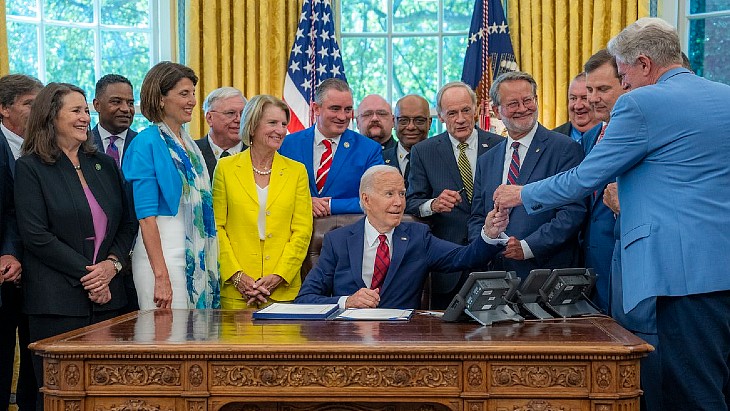First neutron generator delivered to Mo-99 facility
.jpg)
The accelerator system has been designed and built specifically for the Shine project by Phoenix LLC, also of Wisconsin, and will produce radioisotopes for use in medical imaging. Phoenix has previously designed prototypes to demonstrate the neutron output and up-time required for medical radioisotope production, but this is the first system designed for regular commercial use, Shine said yesterday.
"This delivery represents the culmination of almost a decade of joint work between Phoenix and Shine, moving from proof of concept, to proof of scale, and now to a commercial-ready unit that can produce thousands of doses of medicine per day when paired with the Shine target," Shine CEO Greg Piefer said. The tests will prove the technology is ready for production and provide important maintenance and operational data well in advance of starting up the actual plant, he added.
Ross Radel, CEO of Phoenix, said the company's mission is to tackle "humanity's greatest challenges" with nuclear technology. "Through our partnership with Shine, our neutron generators will support production of enough Mo-99 to provide millions of people a year with the critical imaging procedures they need," he said.
Mo-99 is the precursor of technetium-99m (Tc-99m), the most widely used isotope in nuclear medicine. With a half-life of only 66 hours, Mo-99 cannot be stockpiled, and security of supply is a key concern. Mo-99 has primarily been produced by a limited number of research reactors, many of which have been operating since the 1960s, and at times supply has been subject to disruptions and significant radioisotope shortages following outages at those reactors.
There has been no commercial production of the isotope in the USA since 1989. Since 2009 the US Department of Energy's National Nuclear Security Administration (NNSA) has been working in partnership with US commercial entities to accelerate the development of technologies to produce the radioisotope domestically, without the highly-enriched uranium (HEU) targets from which most Mo-99 is currently produced. The HEU targets are themselves seen as a potential nuclear proliferation risk.
Shine's system uses low-energy, accelerator-based neutron source to fission a low-enriched uranium target dissolved in an aqueous solution. The company in 2016 received approval from the US Nuclear Regulatory Commission to construct the facility, and announced the completion of the first building on its Jamesville campus - Building One, where the first production unit is to be installed - earlier this year.
Construction of the commercial facility, which will contain eight isotope production units each with its own Phoenix neutron generator, is to begin in next spring. Commercial production of Mo-99 is scheduled to begin in 2021.



_49215.jpg)





_66488.jpg)


